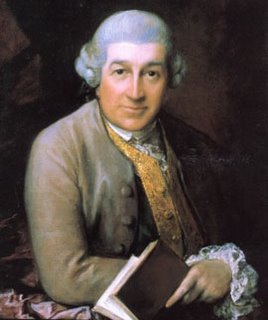19 February: Boreham on David Garrick

Creator of a Craft
In commemorating the birthday of David Garrick; the world honours the name of a very great Englishman. When he died in 1779, three striking tributes were paid to the excellence of his character and the splendour of his influence. He was buried in Westminster Abbey with the most imposing solemnities and amidst an unprecedented concourse of mourners representative of every phase of English life; Dr. Johnson sorrowfully declared that his passing had eclipsed the gaiety of nations; and Oliver Goldsmith, in a stately ode, sang, in the most accurate, the most discriminating, and the most eloquent terms, the sterling qualities of the man whom millions lamented. By his noble life, his dazzling powers, and his masterly achievements, Garrick gave an entirely new status to the theatre, and proved that an actor who takes his task seriously can become, not only a clever entertainer, but a commanding figure in the cultural life of his time.
Born in abject poverty, and willing to do anything to earn a living, he obtained employment as a scene-shifter at a small playhouse. But everybody about the place soon recognised that the boy was a born mimic. His face and voice were absolutely at the command of his will. All his powers were extraordinarily flexible. Diderot says that he once saw Garrick put his face between two screens, and, without saying a word, portray twenty different emotions in as many seconds. It was this subtle skill in the most difficult department of stagecraft that marked the young scene-shifter as an actor of the finest type and that, on his admission to the profession, secured his immediate success.
Unspoiled By Fame And Fortune
Garrick's superb personality revealed itself in the fact that, rising at a bound from obscurity to fame, from poverty to affluence, he remained delightfully unspoiled by the sensational transition. Dr. Johnson was at first very dubious about Garrick's phenomenal prosperity. It seemed to him a cruel injustice that one man should become rich by merely repeating, with grimace and gesticulations, what better men had written. But when he saw that the young actor assumed no airs, betrayed no affectations or artificialities, and clung to the friends whom he had made in his earlier days, Johnson threw his suspicions to the winds and counted the companionship of Garrick one of life's loftiest prizes.
Austin Dobson, in his assessment of Garrick's influence on history, stresses this feature as his outstanding virtue. Garrick never strutted; he was always exquisitely natural. He stood, Dobson says, for truth against tradition; for the emancipating influence of Diderot as against the retrograde influence of Voltaire. The atmosphere of Garrick's stage technique was in perfect harmony with the atmosphere of daily life. Herein lay the basic secret of his greatness.
A Triumph of Unselfishness
To sum up the whole situation, Garrick was a great actor because he was a great man and he was a good actor because he was a good person. He moved others to deep and profound emotion because he himself felt so acutely all that he portrayed. One of his familiar cronies has told how, in a London drawing room, Garrick described an experience that had just befallen him on the street. He had seen a baker's boy mischievously salute a passing comrade. In doing so, his basket of cakes fell from his head, with the result that the buns soon littered the gutter. Garrick convulsed the entire company as he described the errand boy's earlier antics; everybody sat breathless as the actor stood dumbfounded and dismayed over the fallen basket; and, when he burst into tears over the consequent damage, there were few dry eyes in the room. And the vital truth is that the tears that the actor shed were perfectly genuine.
On the stage, as in private life, it was second nature to him to put himself in the other man's place. When he heard that his old friend Dr. Johnson was in need, he asked Albany Wallis to hand the doctor a roll of notes without revealing the source of the gift. "Wallis," exclaimed the doctor, deeply moved, "I know whence this money comes. Tell Mr. Garrick that his goodness is almost too much for me. Tell him, too, that I shall never be able to repay either this sum nor any of the amounts that he has anonymously sent me." To men of this fine type—men who owe their success to their genius for living their lives in the lives of others—the world does not grudge any laurels that eventually adorn their brows.
F W Boreham


<< Home